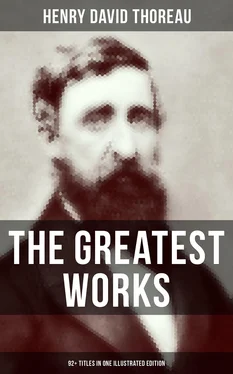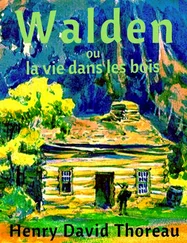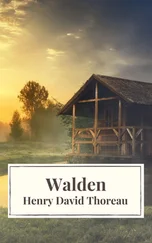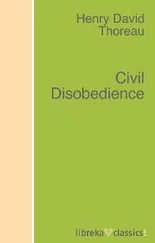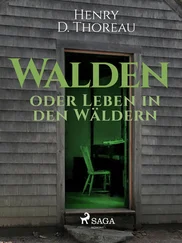Hard green wood just cut, though I used but little of that, answered my purpose better than any other. I sometimes left a good fire when I went to take a walk in a winter afternoon; and when I returned, three or four hours afterward, it would be still alive and glowing. My house was not empty though I was gone. It was as if I had left a cheerful housekeeper behind. It was I and Fire that lived there; and commonly my housekeeper proved trustworthy. One day, however, as I was splitting wood, I thought that I would just look in at the window and see if the house was not on fire; it was the only time I remember to have been particularly anxious on this score; so I looked and saw that a spark had caught my bed, and I went in and extinguished it when it had burned a place as big as my hand. But my house occupied so sunny and sheltered a position, and its roof was so low, that I could afford to let the fire go out in the middle of almost any winter day.
The moles nested in my cellar, nibbling every third potato, and making a snug bed even there of some hair left after plastering and of brown paper; for even the wildest animals love comfort and warmth as well as man, and they survive the winter only because they are so careful to secure them. Some of my friends spoke as if I was coming to the woods on purpose to freeze myself. The animal merely makes a bed, which he warms with his body, in a sheltered place; but man, having discovered fire, boxes up some air in a spacious apartment, and warms that, instead of robbing himself, makes that his bed, in which he can move about divested of more cumbrous clothing, maintain a kind of summer in the midst of winter, and by means of windows even admit the light, and with a lamp lengthen out the day. Thus he goes a step or two beyond instinct, and saves a little time for the fine arts. Though, when I had been exposed to the rudest blasts a long time, my whole body began to grow torpid, when I reached the genial atmosphere of my house I soon recovered my faculties and prolonged my life. But the most luxuriously housed has little to boast of in this respect, nor need we trouble ourselves to speculate how the human race may be at last destroyed. It would be easy to cut their threads any time with a little sharper blast from the north. We go on dating from Cold Fridays and Great Snows; but a little colder Friday, or greater snow would put a period to man’s existence on the globe.
The next winter I used a small cooking-stove for economy, since I did not own the forest; but it did not keep fire so well as the open fireplace. Cooking was then, for the most part, no longer a poetic, but merely a chemic process. It will soon be forgotten, in these days of stoves, that we used to roast potatoes in the ashes, after the Indian fashion. The stove not only took up room and scented the house, but it concealed the fire, and I felt as if I had lost a companion. You can always see a face in the fire. The laborer, looking into it at evening, purifies his thoughts of the dross and earthiness which they have accumulated during the day. But I could no longer sit and look into the fire, and the pertinent words of a poet recurred to me with new force. —
“Never, bright flame, may be denied to me
Thy dear, life imaging, close sympathy.
What but my hopes shot upward e’er so bright?
What but my fortunes sunk so low in night?
Why art thou banished from our hearth and hall,
Thou who art welcomed and beloved by all?
Was thy existence then too fanciful
For our life’s common light, who are so dull?
Did thy bright gleam mysterious converse hold
With our congenial souls? secrets too bold?
Well, we are safe and strong, for now we sit
Beside a hearth where no dim shadows flit,
Where nothing cheers nor saddens, but a fire
Warms feet and hands — nor does to more aspire;
By whose compact utilitarian heap
The present may sit down and go to sleep,
Nor fear the ghosts who from the dim past walked,
And with us by the unequal light of the old wood fire talked.”
Former Inhabitants and Winter Visitors
Table of Contents
I weathered some merry snow-storms, and spent some cheerful winter evenings by my fireside, while the snow whirled wildly without, and even the hooting of the owl was hushed. For many weeks I met no one in my walks but those who came occasionally to cut wood and sled it to the village. The elements, however, abetted me in making a path through the deepest snow in the woods, for when I had once gone through the wind blew the oak leaves into my tracks, where they lodged, and by absorbing the rays of the sun melted the snow, and so not only made a my bed for my feet, but in the night their dark line was my guide. For human society I was obliged to conjure up the former occupants of these woods. Within the memory of many of my townsmen the road near which my house stands resounded with the laugh and gossip of inhabitants, and the woods which border it were notched and dotted here and there with their little gardens and dwellings, though it was then much more shut in by the forest than now. In some places, within my own remembrance, the pines would scrape both sides of a chaise at once, and women and children who were compelled to go this way to Lincoln alone and on foot did it with fear, and often ran a good part of the distance. Though mainly but a humble route to neighboring villages, or for the woodman’s team, it once amused the traveller more than now by its variety, and lingered longer in his memory. Where now firm open fields stretch from the village to the woods, it then ran through a maple swamp on a foundation of logs, the remnants of which, doubtless, still underlie the present dusty highway, from the Stratton, now the Alms–House Farm, to Brister’s Hill.
East of my bean-field, across the road, lived Cato Ingraham, slave of Duncan Ingraham, Esquire, gentleman, of Concord village, who built his slave a house, and gave him permission to live in Walden Woods; — Cato, not Uticensis, but Concordiensis. Some say that he was a Guinea Negro. There are a few who remember his little patch among the walnuts, which he let grow up till he should be old and need them; but a younger and whiter speculator got them at last. He too, however, occupies an equally narrow house at present. Cato’s half-obliterated cellar-hole still remains, though known to few, being concealed from the traveller by a fringe of pines. It is now filled with the smooth sumach (Rhus glabra), and one of the earliest species of goldenrod (Solidago stricta) grows there luxuriantly.
Here, by the very corner of my field, still nearer to town, Zilpha, a colored woman, had her little house, where she spun linen for the townsfolk, making the Walden Woods ring with her shrill singing, for she had a loud and notable voice. At length, in the war of 1812, her dwelling was set on fire by English soldiers, prisoners on parole, when she was away, and her cat and dog and hens were all burned up together. She led a hard life, and somewhat inhumane. One old frequenter of these woods remembers, that as he passed her house one noon he heard her muttering to herself over her gurgling pot — “Ye are all bones, bones!” I have seen bricks amid the oak copse there.
Down the road, on the right hand, on Brister’s Hill, lived Brister Freeman, “a handy Negro,” slave of Squire Cummings once — there where grow still the apple trees which Brister planted and tended; large old trees now, but their fruit still wild and ciderish to my taste. Not long since I read his epitaph in the old Lincoln burying-ground, a little on one side, near the unmarked graves of some British grenadiers who fell in the retreat from Concord — where he is styled “Sippio Brister” — Scipio Africanus he had some title to be called — “a man of color,” as if he were discolored. It also told me, with staring emphasis, when he died; which was but an indirect way of informing me that he ever lived. With him dwelt Fenda, his hospitable wife, who told fortunes, yet pleasantly — large, round, and black, blacker than any of the children of night, such a dusky orb as never rose on Concord before or since.
Читать дальше
